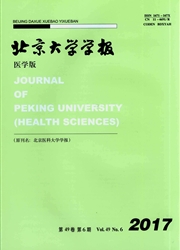

 中文摘要:
中文摘要:
目的:探讨孤儿核受体-雌激素受体相关受体(ERR)α及雌激素受体(ER)α在子宫内膜癌发生、发展中的作用以及临床应用价值。方法:采用免疫组化法检测35例子宫内膜腺癌组织中ERα和ERRα的表达,评估其与临床病理参数之间的关系。结果:Ⅰ期子宫内膜癌组织中ERα的阳性表达率明显高于Ⅱ-Ⅳ期者(P=0.005);而ERRα的阳性表达率明显低于Ⅱ~Ⅳ期者(P=0.007)。ERα(+)和ERRα(-)组中Ⅰ期子宫内膜癌的比例、G1~2级者及肌层浸润深度〈1/2者的数目均明显高于ERα(-)ERRα(+)组(P=0.000,P=0.031和P=0.022)。结论:ERα可作为子宫内膜癌预后良好的指标,而ERRα可能是子宫内膜癌预后不良的指标,二者联合监测有可能提高临床预测价值。
 英文摘要:
英文摘要:
Objective: To explore the roles of estrogen receptor-related receptor (ERR)α and estrogen receptor α in endometrial carcinoma and their clinical values. Methods: Thirty-five cases of endometrial carcinoma were examined by immunohistochemistry. Clinicopathologic features including FIGO stage, histological grade, myometrial invasion and nodal metastasis were reviewed. Results: The expression rate of ERα in patients with FIGO stage Ⅰendometrial carcinoma was more than that in stage Ⅱ-Ⅳ ( P = 0. 005 ) ; The expression rate of ERRα in endometrial carcinoma patients at FIGO stage Ⅰ was lower than that at stages Ⅱ -Ⅳ( P = 0. 007). The percentage of patients at FIGO stage Ⅰ or with G1-2 or myometrial invasion 〈 1/2 in ERα ( + ) and ERRα ( - ) groups was higher than that in ERα ( - ) and ERRα ( + ) groups ( P = 0. 000, P = 0.031 and P = 0. 022). Conclusion: ERα may be a biomarker of good prognosis while ERRα may serve as a biomarker of poor prognosis in endometrial carcinoma. The combinative measure of ERα and ERRα may improve the prognostic value.
 同期刊论文项目
同期刊论文项目
 同项目期刊论文
同项目期刊论文
 期刊信息
期刊信息
